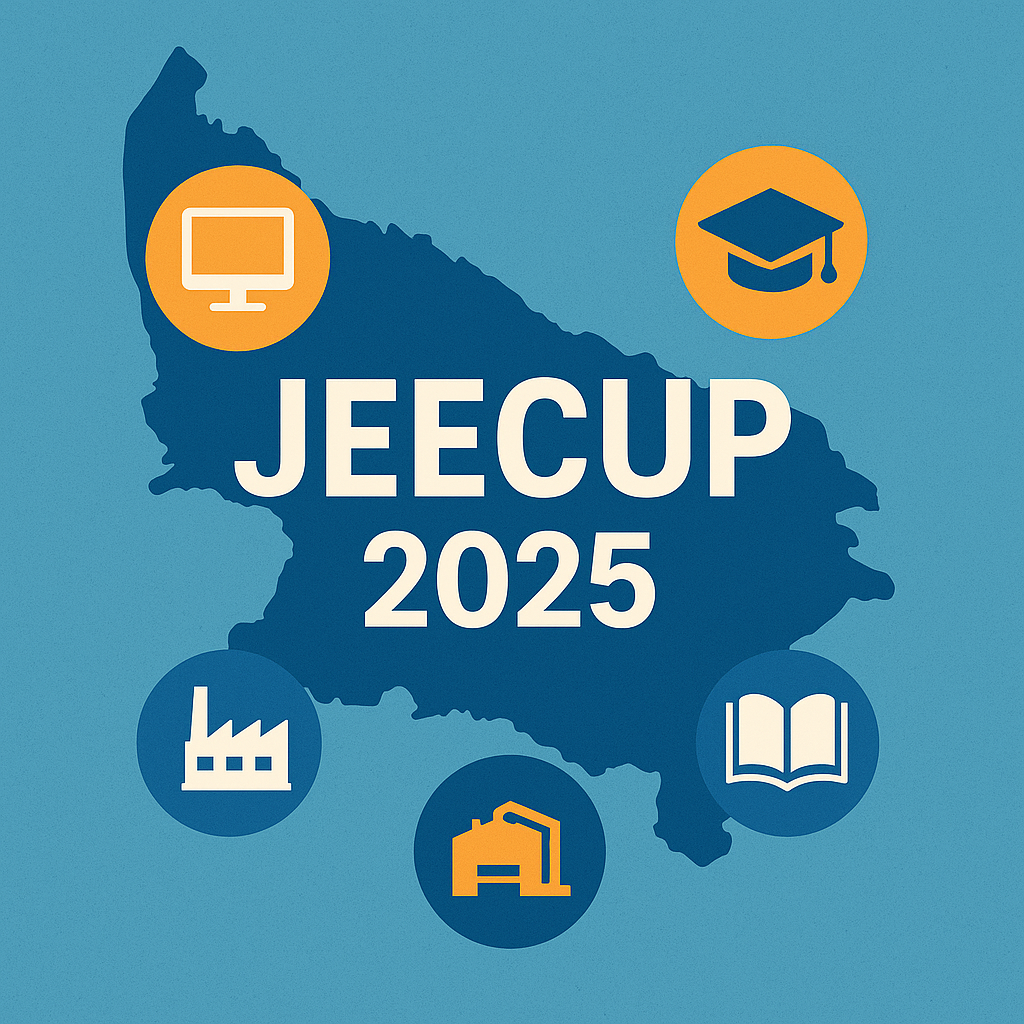Introduction to JEECUP 2025: Your Gateway to Technical Education in UP
The landscape of technical education in Uttar Pradesh is vast and dynamic, offering a multitude of pathways for students aspiring to build robust careers in engineering, technology, and management. At the heart of this ecosystem lies the Joint Entrance Examination Council (Polytechnic), Uttar Pradesh, more commonly known as JEECUP. This comprehensive guide serves as the definitive resource for the JEECUP 2025 session, meticulously detailing every stage of the process—from application to admission and beyond—to empower candidates with the knowledge required for success.
What is JEECUP (UPJEE-P)?
The Uttar Pradesh Joint Entrance Examination (Polytechnic), or UPJEE(P), is the premier state-level entrance examination conducted annually by the Joint Entrance Examination Council, Uttar Pradesh (JEECUP). It serves as the single, standardized gateway for securing admission into a wide array of diploma, post-diploma, and postgraduate diploma programs. These programs span diverse fields including engineering, technology, pharmacy, and management, offered by hundreds of government, government-aided, and private polytechnic institutions affiliated with the Board of Technical Education, Uttar Pradesh (BTEUP) across the state.
The Role of the Joint Entrance Examination Council, Uttar Pradesh (JEECUP)
The Joint Entrance Examination Council, Uttar Pradesh, is the official body entrusted with the responsibility of conducting the UPJEE(P) examination, managing the subsequent eCounselling services, and overseeing the entire admission process. The council ensures a fair, transparent, and merit-based selection process for all aspiring candidates. For the 2025 session, the official website, jeecup.admissions.nic.in, stands as the single, authoritative source for all notifications, application forms, admit cards, results, counselling schedules, and other critical updates. Candidates are strongly advised to refer exclusively to this portal to avoid misinformation from unofficial sources.
Why a Polytechnic Diploma in Uttar Pradesh? An Overview of the Opportunity
Choosing to pursue a polytechnic diploma through JEECUP is a significant strategic decision that offers distinct advantages, particularly within the economic context of Uttar Pradesh. Unlike traditional degree programs that are often theory-intensive, polytechnic education is fundamentally designed to impart practical, hands-on, and industry-relevant skills. This focus on applied knowledge makes graduates highly sought after in the state’s burgeoning industrial sectors, including manufacturing, construction, information technology, and automotive engineering.
A close analysis of the diverse courses offered through JEECUP—ranging from foundational programs like Diploma in Engineering (Group A) and Agriculture Engineering (Group B) to highly specialized Post Graduate Diplomas in fields like Cyber Security, Data Science, and Internet of Things (Group G)—reveals a deliberate alignment with the state’s evolving economic needs. This suggests that the JEECUP framework is not merely an academic gateway but a critical mechanism for workforce development, designed to produce skilled technicians and professionals who are job-ready from day one. Consequently, a polytechnic diploma often represents a more cost-effective and faster route to stable technical employment and a rewarding career, providing a solid foundation for both immediate job prospects and future academic advancement.

The JEECUP 2025 Timeline: Key Dates and Deadlines
Navigating the admission cycle successfully requires a clear understanding of all crucial deadlines. The JEECUP 2025 schedule has undergone revisions, which has led to some confusion across various information platforms. While some initial notifications may have pointed towards an earlier examination period, the final, confirmed schedule has been released by the council. This section provides the authoritative timeline to ensure candidates are aligned with the correct dates.
Navigating the Schedule: From Application to Admission
It is imperative for all applicants to note that the JEECUP 2025 examination was postponed from its initially proposed dates in March to a final schedule in June 2025. This extension of the application window and postponement of the exam reflects a responsive administrative approach by the council, likely aimed at accommodating a larger number of students. However, this has also created a “data fog” online, with many websites still displaying outdated information. This guide cuts through that confusion by presenting the verified schedule. Candidates must treat the official JEECUP website, jeecup.admissions.nic.in, as the ultimate source for any further updates or changes.
JEECUP 2025 Comprehensive Timeline
The following table synthesizes the most consistent and latest information from official announcements and reliable sources, providing a clear and actionable checklist of key dates for the JEECUP 2025 session.
Before embarking on the application journey, it is essential for candidates to thoroughly verify their eligibility for the specific course group they intend to apply for. The JEECUP eligibility criteria are multifaceted, encompassing nationality, age, domicile, and specific academic qualifications that vary significantly across different groups.
Foundational Eligibility Criteria
These are the universal requirements that apply to all candidates irrespective of the group they choose:
- Nationality: All applicants must be citizens of India.
- Age Limit: A key and straightforward rule is that a candidate must be at least 14 years old as of July 1, 2025. There is no upper age limit for appearing in the JEECUP examination, which is a significant advantage for individuals of all ages looking to acquire technical skills or switch career paths.
- Domicile Requirements: The admission process gives priority to candidates from Uttar Pradesh. This includes:
- Candidates who have passed their qualifying examination from an educational institution located within Uttar Pradesh.
- Candidates who are residents of Uttar Pradesh but have passed their qualifying examination from another state. Such candidates must produce a valid domicile certificate issued by the competent authority.
- Candidates from other states are eligible for admission but will only be considered for seats that remain vacant after all eligible UP-domicile candidates have been accommodated. They are treated under the General category for admission purposes.
Group-Wise Academic Qualifications and Exam Subjects
The JEECUP examination is not a single, monolithic test but is structured into different groups (A through L), each corresponding to a specific set of diploma programs. The eligibility criteria and the subjects tested in the entrance exam are tailored to each group. This structure reveals a sophisticated system of distinct educational pathways, creating targeted entry points for students from diverse academic backgrounds, including 10th pass, 12th pass (Science, Commerce, Arts), ITI certificate holders, and even graduates.
One of the most strategic pathways is Group K (Lateral Entry), which validates a two-year ITI vocational certificate as equivalent to a 12th-grade science education for the purpose of direct second-year admission into an engineering diploma. This elevates vocational training from a terminal qualification to a direct bridge into higher technical education, a crucial point for students considering ITI courses.
The table below, based on the official JEECUP 2024 Information Brochure, provides a comprehensive overview of the requirements for key groups.
For certain specialized courses, additional conditions apply. For instance, candidates applying for Group I courses (Diploma in Aircraft Maintenance Engineering) must be free from color blindness and any physical disability that could impede their professional duties. A medical fitness certificate from a registered MBBS doctor is mandatory for admission to all courses to ensure candidates are physically and mentally fit for the rigors of the technical profession.

The Application Journey: A Step-by-Step Guide to Registering for JEECUP 2025
The JEECUP application process is conducted entirely online through the official portal. A systematic approach is key to ensuring a smooth and error-free submission.
Pre-requisites: Documents and Information to Keep Ready
Before initiating the registration, candidates should gather the following documents and information to streamline the process:
- A valid mobile number and email ID (must remain active throughout the admission process).
- Aadhaar card for identity verification.
- Scanned recent color photograph (with name and date printed on it), signature, and left thumb impression in JPG/JPEG format.
- Mark sheets and certificates of qualifying examinations (Class 10, 12, ITI, etc.).
- Category certificate (OBC/SC/ST/EWS) and sub-category certificate (PwD/Freedom Fighter/Military Personnel), if applicable.
- Domicile certificate, if applicable.
- Details for online payment (Credit Card, Debit Card, Net Banking, or UPI).
The 4-Step Online Application Process
The application is a sequential process that must be followed carefully.
Step 1: Online Registration Navigate to the official website jeecup.admissions.nic.in and click on the link for “Online Application Form Submission for JEECUP 2025.” Select “Fresh Candidate Registration” and fill in basic personal details like name, parents’ names, date of birth, gender, and contact information. Upon submission, a unique application number will be generated. Candidates must create a secure password and note down both for all future logins.
Step 2: Filling the Application Form Log in using the newly generated application number and password. Proceed to fill out the main application form, which requires details about your domicile, category, sub-category, chosen examination group(s), preferred examination cities (up to four choices), and detailed academic qualifications. The application system allows candidates to apply for up to four different groups in a single registration cycle, provided they meet the eligibility for each. This flexibility is a strategic feature that allows a candidate to maximize their admission prospects across different streams. For example, a student with a 12th (PCM) background can simultaneously apply for a 3-year Diploma (Group A) and a 2-year Lateral Entry Diploma (Group K), effectively hedging their options.
Step 3: Uploading Scanned Documents Upload the scanned images of your photograph, signature, and left thumb impression as per the specifications mentioned in the information brochure. The photograph should be colored, recent (not older than three months), and clearly display the candidate’s name and the date the photo was taken.
Step 4: Fee Payment The final step is the payment of the non-refundable application fee. The fee structure is based on the candidate’s category.
The Application Correction Window: How to Rectify Errors
JEECUP provides a dedicated window for application correction after the submission deadline. This is the only opportunity for candidates to rectify any inadvertent errors made in the form. It is crucial to review all details meticulously before the correction window closes, as no changes will be permitted afterward.
Mastering the Examination: JEECUP 2025 Pattern and Syllabus
A thorough understanding of the examination pattern and syllabus is fundamental to crafting an effective preparation strategy. The JEECUP 2025 exam is designed to test the foundational knowledge and aptitude of candidates relevant to their chosen field of study.
Overall Exam Structure
The examination for all groups will adhere to the following structure:
- Mode of Exam: The test will be conducted exclusively online as a Computer-Based Test (CBT).
- Duration: The total time allotted for the examination is 2 hours and 30 minutes (150 minutes).
- Language of Paper: The question paper will be bilingual, available in both Hindi and English.
- Question Format: The paper will consist of 100 objective-type Multiple-Choice Questions (MCQs), with each question having four options and only one correct answer.
The Marking Scheme Explained: The “No Negative Marking” Advantage
There has been conflicting information online regarding the marking scheme. However, based on the most authoritative source—the official JEECUP 2024 Information Brochure—the marking scheme for the 2025 session is as follows:
- Correct Answer: marks will be awarded for every correct response.
- Incorrect Answer: There is NO negative marking for incorrect answers.
- Unattempted Question: 0 marks.
This “no negative marking” policy is a significant strategic element. Candidates are strongly advised to attempt all 100 questions. Even if unsure, making an educated guess carries no penalty and could potentially add to the final score. Information on some websites mentioning a penalty of -1 mark for wrong answers is outdated and should be disregarded.
Detailed Exam Pattern and Syllabus by Group
The syllabus for the JEECUP exam is generally based on the curriculum of Class 10, 11, and 12 of the Uttar Pradesh Board (UP Board). The subject-wise weightage varies for each group, as detailed in the eligibility table in Section 3. For instance:
- Group A (Engineering Diploma): The questions are split equally between Mathematics (50%) and a combined section of Physics & Chemistry (50%), based on the Class 10 syllabus.
- Group E (Pharmacy Diploma): The paper consists of Physics & Chemistry (50%) and a choice between Biology or Mathematics (50%), based on the Class 12 syllabus.
- Group K (Lateral Entry): The exam tests High School level Physics, Chemistry, and Mathematics (40%) and a comprehensive section on the candidate’s specific engineering trade from their ITI or Intermediate (Vocational) studies (60%).
Preparation Strategy: Leveraging Official Resources
To excel in the exam, candidates should align their preparation with the official resources provided by JEECUP.
- Official Syllabus: Download the detailed, group-wise syllabus PDF from the
jeecup.admissions.nic.inwebsite to focus studies on relevant topics. - Official Mock Test: The council activates a link for the JEECUP Mock Test on its portal before the exam. This is an invaluable tool. It allows candidates to familiarize themselves with the CBT interface, understand the navigation, manage their time effectively, and get a feel for the actual exam environment. Regular practice with the mock test is highly recommended for self-assessment and strategy building.

From Exam Hall to Scorecard: Navigating Post-Exam Procedures
The JEECUP process extends well beyond the examination day. A series of structured post-exam events are designed to ensure transparency and fairness in the evaluation and ranking of candidates.
Downloading the Admit Card and Exam Day Instructions
The JEECUP admit card is a mandatory document for entry into the examination hall. It is released online a week or two before the exam dates. Candidates must download it from the official website using their application number and password. On the day of the exam, candidates must carry a printed copy of the admit card along with their original Aadhaar Card for verification. Items such as calculators, mobile phones, log tables, and any textual material are strictly prohibited inside the exam center.
Accessing the Provisional Answer Key and Response Sheet
A few days after the conclusion of the examination, JEECUP releases the provisional answer key for all question paper sets, along with each candidate’s recorded response sheet. This allows candidates to compare their answers with the official key and calculate their probable score, fostering a high degree of transparency in the evaluation process.
The Objection Process: How to Challenge the Answer Key
If a candidate believes there is an error in the provisional answer key, they have the right to challenge it through a formal objection process. This is done online via the official portal within a specified window. A nominal, non-refundable processing fee (e.g., Rs. 100 per question) is charged for each challenge. If the objection is found to be valid by the subject matter experts, the fee is refunded, and a final, revised answer key is published.
Understanding Your JEECUP 2025 Result and Scorecard
The JEECUP result is declared online on the official website, typically within a week or two of the exam’s conclusion. Candidates can access their results by logging in with their application/roll number and date of birth. The result is presented in the form of a scorecard or rank card, which contains the following details:
- Candidate’s personal information.
- Marks obtained in the examination.
- State-wise Open Rank.
- Category-wise rank (if applicable).
- Qualifying status for counselling.
A crucial aspect of the result calculation is the Normalisation Process. Since the JEECUP exam is conducted in multiple shifts over several days, the difficulty level of the question papers may vary slightly. To ensure fairness and negate any advantage or disadvantage due to these variations, a statistical normalization formula is applied to the raw scores. The final rank and merit list are prepared based on these normalized scores, not the raw marks. This entire post-exam procedure—from releasing response sheets to allowing objections and using a normalization formula—demonstrates a mature and robust evaluation system designed to build candidate trust and ensure the integrity of the selection process.
The eCounselling Maze: Securing Your Polytechnic Seat
Qualifying in the JEECUP exam is only the first step; securing admission into a desired college and course depends entirely on successfully navigating the multi-round online counselling process. This process is centralized and managed by JEECUP for all participating government, aided, and private institutions.
Overview of the Multi-Round Online Counselling Process
The JEECUP eCounselling is typically conducted in several rounds, sometimes extending up to 7 or 8 rounds, to ensure maximum seat allocation. Only candidates who have qualified in the entrance exam and feature in the rank list are eligible to participate. The entire process, from registration to fee payment, is conducted online.
Step-by-Step Guide to eCounselling
Candidates must meticulously follow each step of the counselling process to confirm their admission.
Step 1: Registration and Fee Payment Qualified candidates must first register for counselling on the official portal using their JEECUP roll number and password. A one-time, non-refundable counselling registration fee (approximately Rs. 250) must be paid online to participate in all rounds of counselling.
Step 2: Choice Filling and Locking This is the most critical stage of the entire admission process. Candidates must fill in their choices of colleges and courses in the order of their preference (from most desired to least desired). There is no limit on the number of choices that can be filled in the initial rounds. It is highly advisable to fill as many choices as possible to maximize the chances of securing an allotment. Once finalized, the choices must be locked before the deadline.
Step 3: Seat Allotment JEECUP will process the choices based on the candidate’s rank, category, and the availability of seats, and then release the seat allotment results for each round online. Candidates can check their allotment status by logging into their accounts.
Step 4: Seat Acceptance (Freeze vs. Float) Upon receiving a seat allotment, a candidate has two options. This decision is crucial and determines their participation in subsequent rounds.
- Freeze: If the candidate is satisfied with the allotted seat and does not wish to be considered for any other seat, they must choose the ‘Freeze’ option. They then need to pay the Seat Acceptance Fee (approximately Rs. 3,000) online to confirm the seat.
- Float: If the candidate accepts the allotted seat but wishes to be considered for a higher-preference choice in the next round of counselling, they must choose the ‘Float’ option. They are still required to pay the Seat Acceptance Fee to hold their current allotment. If they are allotted a better seat in the next round, their previous allotment is automatically cancelled. If not, they retain the seat from the current round.
The ‘Float’ option is a powerful strategic tool. It allows a candidate to secure a backup option while still aspiring for a more preferred college or branch. Unless a candidate is allotted their first choice, it is generally advisable to opt for ‘Float’ in the initial rounds to keep better options open.
Step 5: Document Verification Candidates who ‘Freeze’ their seat must report to one of the designated District Help Centers for physical document verification. They must carry all original documents along with two sets of photocopies.
Step 6: Final Admission After successful document verification, candidates must pay the remaining institutional admission fee online through their login. Finally, they must report to the allotted polytechnic institute by the specified date to complete the admission formalities.
Document Verification Checklist
Having all documents ready is non-negotiable for a smooth verification process. A missing document can lead to the cancellation of candidature.
Seat reservation plays a significant role in the admission process, providing equitable opportunities to candidates from various social and economic backgrounds. It is crucial for candidates to understand the reservation policy to accurately assess their admission chances.
Reservation for Uttar Pradesh Domicile Candidates
The reservation policy as mandated by the Government of Uttar Pradesh is applicable only to candidates who hold a valid UP domicile certificate. Candidates from other states are not eligible for reservation benefits and are considered under the General (Open) category for the remaining seats. The reservation is implemented in two ways: Vertical and Horizontal.
Vertical and Horizontal Reservation Percentages
The following table outlines the reservation percentages for different categories. Vertical reservations are for social categories, while horizontal reservations cut across all vertical categories.
Choosing Your Future: Top Polytechnic Colleges in Uttar Pradesh
Uttar Pradesh is home to a vast network of polytechnic institutions, each offering a unique blend of courses, infrastructure, and opportunities. Making an informed choice during the counselling process is vital for a successful academic journey.
Types of Institutions: Government, Aided, and Private
The colleges participating in JEECUP counselling are broadly classified into three types:
- Government Polytechnics: Fully funded and managed by the state government, these institutions are known for their highly subsidized fees and established reputation. Examples include Government Polytechnic, Lucknow, and Government Polytechnic, Kanpur.
- Aided Polytechnics: These are semi-governmental institutions that receive financial aid from the government. Their fee structure is typically moderate, falling between government and private colleges. Examples include Hewett Polytechnic, Lucknow, and D.N. Polytechnic, Meerut.
- Private Polytechnics: These institutions are self-financed and generally have higher fees. They often offer modern infrastructure and specialized courses. Examples include Ambalika Institute of Management and Technology, Lucknow, and IIMT College of Polytechnic, Greater Noida.
Strategic Choice Filling: Using Opening and Closing Ranks
JEECUP publishes the opening and closing ranks for all colleges and courses after each counselling round on its official website. This data is an invaluable resource for strategic choice filling. By analyzing the previous year’s cutoffs, candidates can get a realistic estimate of the rank required for their desired college and branch. This allows them to create a prioritized list of choices that balances ambitious aspirations with realistic possibilities, significantly improving their chances of securing a favorable allotment.
Life After Polytechnic: Career Prospects and Higher Education
A diploma from a polytechnic institute in Uttar Pradesh opens up a dual pathway: immediate entry into the workforce or a strategic route to higher education. This flexibility is one of the greatest strengths of polytechnic education.
Immediate Job Opportunities: Public vs. Private Sector
Polytechnic graduates are highly valued for their practical skills and are readily absorbed by both the public and private sectors.
- Public Sector: Government departments and Public Sector Undertakings (PSUs) are major recruiters. Diploma holders can find opportunities as Junior Engineers, Technicians, and Apprentices in organizations like the Indian Railways, BHEL, ONGC, DRDO, NTPC, and various state electricity boards and public works departments.
- Private Sector: The demand is robust across numerous industries. Key sectors include IT and software services (TCS, Wipro, HCL), automotive manufacturing (Maruti Suzuki, TATA Motors, Bajaj Auto), construction (L&T, DLF), and electronics manufacturing. Common job profiles include Junior Engineer, Site Supervisor, Production Engineer, Technician, IT Support Specialist, and CAD Draftsman.
Expected Salary Ranges for Fresh Diploma Holders
While salaries can vary based on the industry, company, and candidate’s skills, fresh diploma holders can expect a starting salary package in the range of ₹1.5 Lakhs to ₹4 Lakhs per annum. Students from top government polytechnics with excellent academic records and skills can secure higher packages, sometimes reaching up to ₹5-8 LPA from premier companies during campus placements.
The Path to Higher Education: A Strategic Advantage
For many, a diploma is a stepping stone to a full-fledged engineering degree. This pathway offers a unique advantage over the traditional route.
- Lateral Entry into B.Tech: The most significant academic progression for a diploma holder is securing lateral entry into the second year (third semester) of a Bachelor of Technology (B.Tech) program. This allows them to complete their engineering degree in just three years, effectively saving one academic year.
- Admission through UPCET: In Uttar Pradesh, admission to B.Tech lateral entry programs is primarily conducted through the Uttar Pradesh Combined Entrance Test (UPCET), which was formerly known as UPSEE. Eligibility for UPCET lateral entry typically requires a three-year engineering diploma with a minimum of 45% aggregate marks (40% for reserved categories).
- A Superior Educational Path?: The “Diploma + Lateral Entry B.Tech” (3+3 years) pathway presents a powerful alternative to the traditional “12th + B.Tech” (2+4 years) route. While both take six years post-Class 10, the polytechnic route offers a practical-first approach. A diploma holder is employable after just three years and can even “earn while they learn.” They enter the B.Tech program with a much stronger foundation in practical engineering concepts, often giving them an edge over their peers. This makes the polytechnic diploma not just a qualification, but the first stage of a highly strategic and flexible engineering career roadmap.
Conclusion: Maximizing Your JEECUP Success for a Bright Future
The Joint Entrance Examination Council (Polytechnic), Uttar Pradesh (JEECUP) 2025 is more than just an entrance exam; it is the foundational step towards a promising and versatile technical career. From its diverse range of industry-aligned courses and flexible eligibility criteria to a transparent, multi-round counselling process, the JEECUP system is designed to cater to a wide spectrum of students and channel them into the skilled workforce that Uttar Pradesh needs.
Success in this journey requires a strategic and informed approach. Candidates must diligently follow the official timeline, carefully assess their eligibility to apply for a portfolio of suitable course groups, and master the exam pattern. The true test of strategy, however, lies in the eCounselling process, where judicious use of the ‘Float’ option and well-researched choice filling can make all the difference. Whether the goal is immediate employment in a high-demand technical role or laying a strong practical foundation for a future B.Tech degree, the path begins here. By leveraging the information in this guide, aspiring students can navigate the complexities of JEECUP 2025 with confidence and take a decisive step towards a bright and stable future in the world of technology and engineering.
Discover more from DiviseemaPolytechnic
Subscribe to get the latest posts sent to your email.





